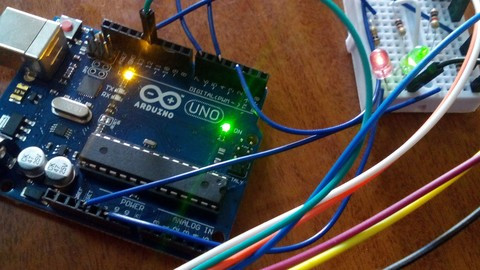Finding the factors of a number is a fundamental concept in mathematics and programming. Factors are the numbers that divide a given number completely without leaving a remainder. In C++, learning to find factors helps beginners understand loops, conditional statements, and basic mathematical operations. This concept is widely used in applications like divisibility checks, prime number verification, and problem-solving in competitive programming.

with hands-on learning.
get the skills and confidence to land your next move.
Program 1: Simple Loop Method to Find Factors
The simplest way to find factors of a number is by checking all numbers from 1 to the number itself. This method is easy to understand for beginners.
#include <iostream>
using namespace std;
int main() {
int n;
cout << "Enter a number: " << endl;
cin >> n;
cout << "Factors of " << n << " are: ";
for(int i = 1; i <= n; i++) {
if(n % i == 0) {
cout << i << " ";
}
}
cout << endl;
return 0;
}In this program, we loop from 1 up to the input number n. For each number, we check if it divides n completely using the modulo operator %. If it does, the number is a factor and we print it. This method is straightforward and perfect for beginners to see how loops and conditional checks work in practice.
Program 2: Optimized Method Using Square Root
Checking all numbers up to n can be inefficient for large numbers. We can optimize by checking only up to the square root of n and printing both the divisor and the corresponding quotient.
#include <iostream>
#include <cmath>
using namespace std;
int main() {
int n;
cout << "Enter a number: " << endl;
cin >> n;
cout << "Factors of " << n << " are: ";
for(int i = 1; i <= sqrt(n); i++) {
if(n % i == 0) {
cout << i << " ";
if(i != n / i) { // Avoid printing the square root twice
cout << n / i << " ";
}
}
}
cout << endl;
return 0;
}This optimized approach reduces the number of iterations significantly. Instead of checking every number up to n, we only check up to sqrt(n). When a divisor is found, we also print the corresponding quotient, ensuring all factors are included. Beginners learn how mathematical insights can make programs more efficient without adding complexity.
Program 3: Using a Custom Function
Encapsulating factor-finding logic into a function makes the code reusable and modular. This is helpful when you need to find factors of multiple numbers.
#include <iostream>
#include <cmath>
using namespace std;
void printFactors(int n) {
cout << "Factors of " << n << " are: ";
for(int i = 1; i <= sqrt(n); i++) {
if(n % i == 0) {
cout << i << " ";
if(i != n / i) {
cout << n / i << " ";
}
}
}
cout << endl;
}
int main() {
int n;
cout << "Enter a number: " << endl;
cin >> n;
printFactors(n);
return 0;
}By using the printFactors() function, we can easily check factors of any number without rewriting the code. This teaches beginners about functions, code reuse, and cleaner programming practices. Functions also make programs easier to read and maintain.
Program 4: Finding Factors Using Prime Factorization
Prime factorization breaks a number into its prime factors and then generates all possible combinations to find every factor. This approach is particularly useful for large numbers because it reduces repeated division checks and provides insight into the structure of the number.
#include <iostream>
#include <vector>
#include <cmath>
#include <algorithm> // For find() and sort()
using namespace std;
// Function to find prime factors
vector<int> primeFactors(int n) {
vector<int> factors;
while(n % 2 == 0) {
factors.push_back(2);
n /= 2;
}
for(int i = 3; i <= sqrt(n); i += 2) {
while(n % i == 0) {
factors.push_back(i);
n /= i;
}
}
if(n > 2)
factors.push_back(n);
return factors;
}
// Recursive function to generate all factors from prime factors
void generateFactors(const vector<int>& primes, vector<int>& currentFactors, int index, vector<int>& allFactors) {
if(index == primes.size()) {
int product = 1;
for(int num : currentFactors)
product *= num;
if(find(allFactors.begin(), allFactors.end(), product) == allFactors.end())
allFactors.push_back(product);
return;
}
// Include current prime
currentFactors.push_back(primes[index]);
generateFactors(primes, currentFactors, index + 1, allFactors);
// Exclude current prime
currentFactors.pop_back();
generateFactors(primes, currentFactors, index + 1, allFactors);
}
int main() {
int n;
cout << "Enter a number: " << endl;
cin >> n;
vector<int> primes = primeFactors(n);
vector<int> allFactors;
vector<int> current;
generateFactors(primes, current, 0, allFactors);
sort(allFactors.begin(), allFactors.end());
cout << "Factors of " << n << " are: ";
for(int factor : allFactors)
cout << factor << " ";
cout << endl;
return 0;
}In this program, we first find the prime factors of the number using the primeFactors() function. Then, using recursion in generateFactors(), we create all possible products of these prime factors to obtain every factor of the number. Sorting and printing these products gives the complete list of factors. Beginners can see how breaking a problem into prime components simplifies computation and allows handling larger numbers efficiently. This method also demonstrates recursion and combinatorial thinking, expanding understanding beyond simple loops.
Frequently Asked Questions (FAQ)
Here are some common questions beginners ask about finding factors in C++:
Q1: What is a factor of a number?
A factor is a number that divides another number completely without leaving a remainder.
Q2: Are negative numbers considered factors?
Yes, negative numbers that divide the number without remainder are also factors, but typically only positive factors are considered in basic programs.
Q3: Why use the square root method?
Using the square root reduces the number of checks, making the program faster for large numbers.
Q4: What is prime factorization and why use it?
Prime factorization breaks a number into its prime components. It helps efficiently generate all factors, especially for large numbers, by reducing repeated division checks.
Q5: Can I reuse a function to find factors of multiple numbers?
Yes, creating a function makes your code modular, allowing it to be reused for different inputs or ranges.
Conclusion
Finding factors of a number in C++ is an excellent way for beginners to practice loops, conditionals, functions, and recursion. We explored four methods: a simple loop, an optimized square root approach, a reusable function, and an advanced prime factorization technique. Beginners should start with simple loops to understand the basic logic, then move to optimized methods for moderately large numbers. For very large numbers, prime factorization provides an efficient and elegant solution. Practicing these methods helps strengthen programming skills, mathematical reasoning, and problem-solving abilities.
Additional & References
Understanding factors is fundamental for problems involving divisibility, prime numbers, and basic number theory. Beginners are encouraged to practice finding factors for different ranges and experimenting with optimizations.
- C++ Reference –
<cmath>– Documentation for mathematical functions likesqrt(). - GeeksforGeeks – Factors of a Number in C++ – Detailed explanations and examples.
- Programiz C++ Tutorials – Beginner-friendly tutorials and exercises.
- W3Schools C++ – Practical examples and syntax reference.







